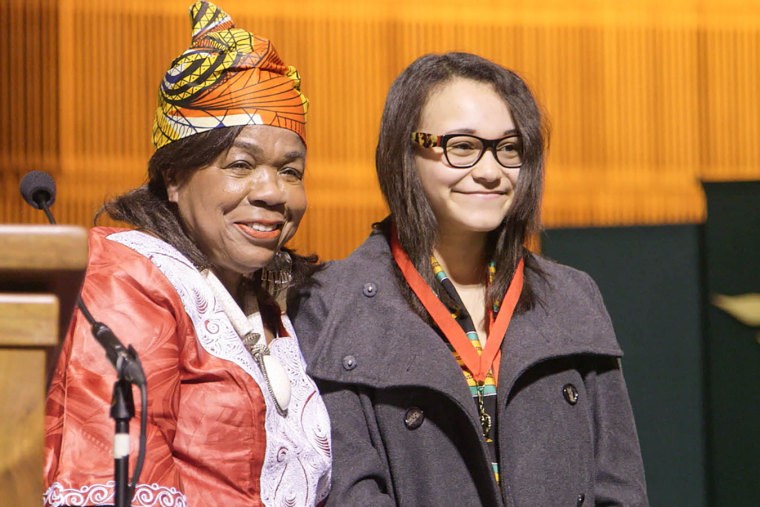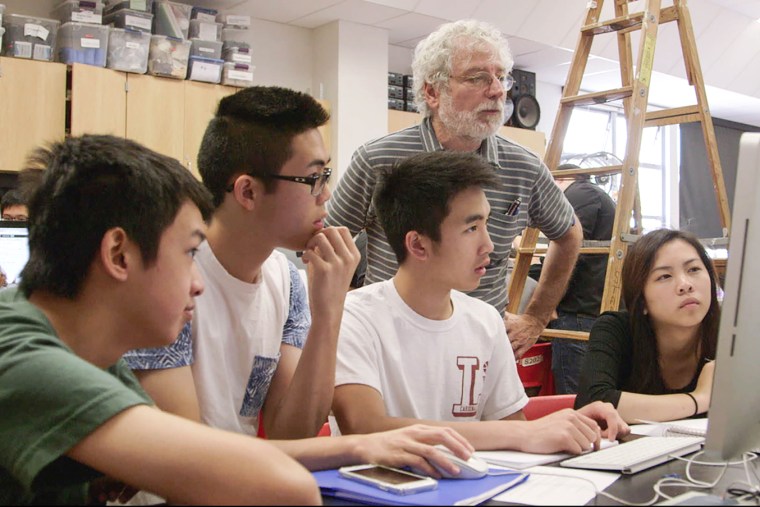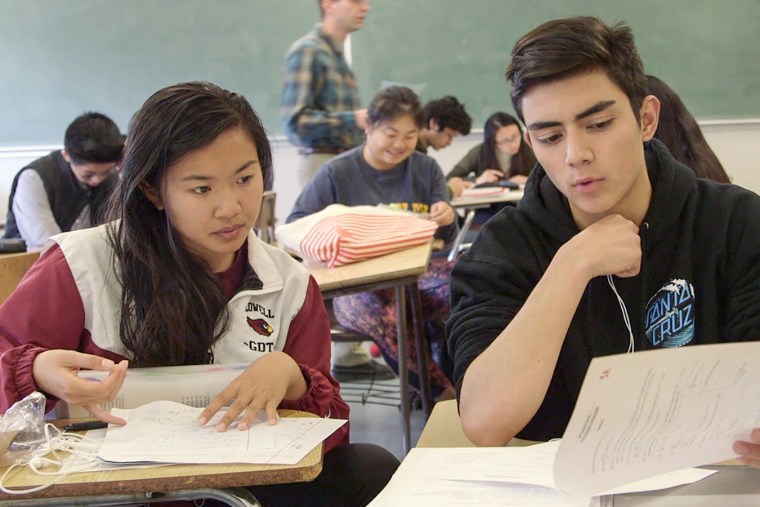Film aims to humanize working-class Asian Americans with elite college dreams
[ad_1]
In a documentary on San Francisco’s demanding Lowell Higher College, an Asian American scholar chastises his mother for saying that his father never completed high faculty.
“Don’t say that,” then-senior Alvan Cai claims in Mandarin to his mother, Capri, off-digicam right before speaking to the filmmakers. “I never want individuals to assume lowly of my father or anything at all.”
Even though Asian Americans who try for leading-tier faculties are stereotyped as currently being from wealthy, educated households, the reality extra typically resembles tales like Cai’s: small children of functioning-class immigrants who get on to the thought of greater instruction as a automobile for stability in the U.S.
It’s these learners whom director Debbie Lum claimed she hoped to humanize in her documentary, “Try Harder!,” which manufactured its broadcast debut Monday on PBS’s Unbiased Lens.
“These are the youngsters who simply cannot afford to go to personal college. People lender on that,” Lum explained to NBC Asian The united states. “It is a way for anyone who didn’t have access to have a way up in society.”

Educators and co-chair of San Francisco African American Honor Roll, with honor student
Rachael Schmidt in a scene from “Attempt More difficult!”Courtesy Greenwich Amusement
The documentary, which premiered at Sundance last yr, chronicles the life of 5 learners in the course of the 2016-17 faculty year as they embark on a grueling university admissions course of action.
For seniors across the state, the admissions journey may coloration a part of their high university practical experience. But for all those at Lowell, the city’s prime community university, the documentary reveals how the system just about one-handedly defines students’ coming-of-age, thrusting them into the ebbs and flows of anticipation and heartbreak.
The pupils are noticed shouldering the stress of extracurriculars ranging from student authorities to science competitions to sporting activities, together with several advanced placement lessons, and operate. On top of it all, several say they are in continual negotiation between their very own dreams and those of their parents. Lum said that with its demanding setting, Lowell is normally described as “elite.” But the phrase comes with socioeconomic baggage that does not fairly correctly mirror Lowell college students.
“For the most portion, and historically talking, it is the young ones who are coming from Chinatown, taking an hour bus trip to get there,” Lum explained. “Maybe they are living in Chinatown SRO [single-room occupancy] housing.”

According to the most modern Lowell Substantial Faculty Accountability Report Card, produced by the San Francisco Unified College District, the pupil population is overwhelmingly designed up of people today of coloration, with Asian Us citizens constituting a lot more than 50 per cent. Much more than a third of the student body is regarded “socioeconomically disadvantaged.” And more than a quarter qualify for absolutely free lunch.
Lum claimed it was apparent that a lot of of the mother and father, who’re generally Asian immigrants, played no little component in their children’s education and learning, prodding them towards sure endeavors and carting them all-around to after-school routines.
But a great deal of their involvement, Lum explained, appeared to be pushed by a belief in the American Dream and a have confidence in in meritocracy. The mentality isn’t particular to Lowell, either, but a person that is generally misinterpreted and labeled as a symptom of overbearing “tiger parenting.”
Pawan Dhingra, a sociologist and a professor of American research at Amherst School, earlier explained that the yearning to show up at elite educational facilities is rooted in the belief that schooling is the only way for Asian American kids to contend with many others, specifically whites. The majority of Asian Us residents come from immigrant people and do not have present social connections to assistance safe positions or internships.
Lum reported these spouse and children values spawn a one of a kind tradition among the college students, who are bound by a shared comprehending that their dedication by itself could most likely lift them, and their family members, up into much better situation.
“There is the form of neighborhood in which they’re all in it alongside one another and nobody has a specific pass,” Lum claimed. “There aren’t learners who, their mothers and fathers are sitting down on the board of anything or other.”

The director reported that this surroundings resulted in a social hierarchy that hugely values educational accomplishment and talent, features core to admissions. Social existence, in contrast to many other schools, does not orbit all around the jocks. Jonathan Chu, for illustration, is witnessed as a “Lowell God.” in the movie. He excels in his AP classes, masters the violin and many sports activities, and serves as college student overall body president.
Lum stated she figured out in filming that Chu was also an fantastic piano player and rumored to ice skate as properly. These in the movie just about lionize him, speaking about Chu as if he ended up a legendary icon, for whom they have good admiration. And of study course, he’s been accepted to Harvard.
The emphasis on excellence is so pervasive in their social circles, Lum said, that one scholar, Ian Wang, used extra stress on himself even with active encouragement from his dad and mom, who are Lowell alums, to consider a considerably less intensive class load.
“Ian made use of to get so significantly flak, mainly because he only took two AP lessons in his junior year,” Lum recalls. “We experienced already seen the little ones giving him a seriously tough time about what his mother felt seriously undesirable about … she was like, ‘I never want you to eliminate by yourself.’”
As admission to elite schools occupy the heart of existence at Lowell, affirmative motion continues to be a subject matter that lurks beneath the floor. In a single scene, a physics instructor warns learners that they may perhaps not get into th
eir desire Ivy League university, even if they’ve earned a place, for the reason that his powerpoint slide reads, “You’re Asian!” And in other individuals, Rachel Schmidt, a Black student, reveals some of the assumptions and casual racism directed at her due to the fact of her race.
“Throughout my time at Lowell, I have internalized that stereotype that I get a large amount of things mainly because I’m Black. And I consider for a while, I have tried out to not have up to my blackness,” she admits. “I believe I’ve worked tricky and I feel I have the suitable grades.”
Lum reported that the notion that the playing cards are stacked towards Asian learners looms large. Even Schmidt instructed the filmmakers that she does not think it’s good that her Asian peers are not getting into faculty, just simply because of their race. Even so, Lum said that a bulk of the Asian learners go on to assist affirmative action.
“Our group has been pitted against other minority communities in this unusual way, which is not serious,” Lum stated. “Most of the kids that I talked to had been in guidance of affirmative motion. Even if they thought, ‘Yeah, that could possibly signify it helps make it more difficult for me. but for men and women who have seasoned systemic oppression, There really should be some righting of the wrongs.’”
[ad_2]
Source backlink





